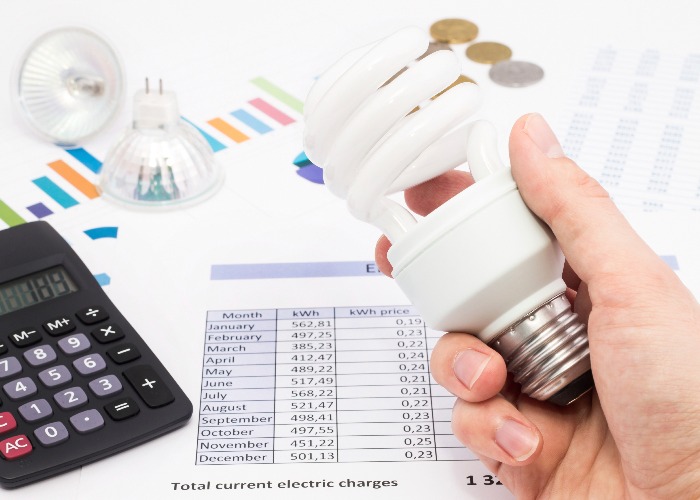Surprise energy bill hike coming: how to slash your bills NOW

With energy bills painfully high, we look at the simple ways you can cut your bills.
Sections
- Bills go up as energy price falls
- Lock into a fixed deal and pay the right way
- Check your bills
- Get insulation - thousands in line for free support
- Claim what you're entitled to
- Stop those draughts
- Cut your energy usage
- Make your radiators work for you
- Layer up
- Get a new boiler (if it's 10+ years old)
Bills go up as energy price falls
Energy bills will rise slightly in January – despite the fact that wholesale prices are falling.
Ofgem, the regulator for the energy sector, confirmed that the Price Cap would rise marginally by £3 to £1,758 in January. The price cap represents how much the typical household can expect to pay for their energy each year.
While a £3 increase is obviously a very minor change, it will nonetheless be a blow to households given that prices had actually been forecast to fall in January as a result of cheaper wholesale prices.
However, it is the impact of Government energy policies that has wiped out any potential savings.
In worse news for hard-pressed households, prices are forecast to rise again, by as much as 5%, in April 2026. This would add around £85 to a typical annual energy bill.
We should stress that such long-term predictions are notoriously difficult to get right, so should be taken with a pinch of salt.
Fight back against rising prices
With bills looking likely to keep rising for the foreseeable future, taking measures to cut our energy use, and therefore our bills, makes a lot of sense.
In this guide, we'll run through the various things you can try. Some will be free, while others will require you to spend some money up front to benefit.
Lock into a fixed deal and pay the right way
One of the fastest and easiest ways to reduce your energy costs is to switch to a cheaper tariff.
Many suppliers now offer fixed-rate deals that undercut the Energy Price Cap, which is set by Ofgem and what the majority of people will be sitting on.
If you’ve not already locked into one, take a few minutes to do so now (this link will take you through to the Uswitch energy comparison page).
It’s really straightforward and will ensure your energy costs per unit are lower throughout the high-usage months, which make up the bulk of your annual energy bill.
In fact, Uswitch estimates a typical household will save £156 over the next year by doing so.
Pay by Direct Debit
It’s also a good idea to pay by direct debit as this should help you to save cash. In fact, paying by Direct Debit could save you between £70 and £90 a year.
It’s easy to set up and means you’ll always pay your bills on time.
Just be aware that energy companies particularly like fixed monthly direct debit payments, as they can be sure you won't default, and they earn interest on any overpayments.
Pay for dual fuel
Next, it’s worth checking to see whether paying for dual fuel – in other words, using the same company for your gas and electricity – works out cheaper.
This isn't always the case, but usually is.
|
PROMOTION
|
||
|
Check your bills
When you receive your bill, make sure it’s showing an actual reading rather than an estimated one (again this is only relevant to households without a smart meter).
It’s far too easy to assume the reading is accurate, but in fact, you may be paying far too much. If the reading is estimated, take the time – it’ll only take a few minutes – to check your meter and submit the reading to your supplier.
Your supplier should then recalculate your bill and re-issue it.
Alternatively, you could get a smart meter installed (although these aren't particularly popular with regular loveMONEY readers).
Shop around for a cheaper energy deal now and save up to £156 (opens in new page)
Get insulation - thousands in line for free support
Hundreds of thousands of homes are eligible for a Government scheme which could help them save up to £400 a year on energy bills.
The Great British Insulation Scheme, which launched last week, is a £1 billion fund which can help cover the cost of installing energy-efficient home improvements.
The Government believes around 300,000 households will qualify for this help, on top of the 2.4 million homes which have already received help with efficiency measures under existing schemes.
Those eligible for help include those living in council tax bands A-D in England, and A-E in Scotland and Wales, who have an energy performance certificate (EPC) rating of D or below.
There’s an online eligibility checker that you can use to establish if you qualify for help, where you will need to answer questions around things like how you heat your home, whether you have solid or cavity walls and whether you are receiving any benefits.
You will then be referred to either your energy supplier or local council for assistance in how to go about making use of the scheme, or existing programmes, in order to make your home more energy efficient.
Improvement work covered by the scheme includes roof, cavity wall and loft insulation.

There’s a good reason that the Great British Insulation Scheme is focusing on improving the insulation of homes across the country ‒ it makes a big difference to our energy bills.
After all, if you’ve got proper insulation in your home, you’ll keep more heat in and therefore save money on your bills.
In fact, according to the Energy Saving Trust, loft insulation could save you up to £475 a year, while cavity wall insulation could save you more than £500 a year, depending on what kind of property you live in.
If you’re worried about how much this will set you back initially, it’s worth finding out whether you are eligible for help from the Government or through a local authority grant.
If you’re over 70, you can have your home insulated for free provided you meet one of these qualifying criteria, and if you’re over 60, there’s also a good chance of getting financial help.
However, even if you don’t fall into these age categories, you may still find you’re entitled to some form of grant, so it’s worth checking to see whether you are eligible.
Claim what you're entitled to
Once we head into the Winter months, Cold Weather Payments are available for those who receive benefits such as Pension Credit, Income Support, income-related Jobseekers' Allowance and income-related Employment and Support Allowance.
With this, you could get £25 for each seven-day period of very cold weather between 1 November and 31 March.
What's more, if you’re struggling financially, all energy providers must offer a Warm Home discount to help their most vulnerable customers.
This is a discount of £150 off your electricity bill.
And you are struggling to pay your bills, make sure you talk to your provider and see if you can be moved to a cheaper tariff.
Search for a cheaper energy deal: see if you could save
Stop those draughts
Research suggests that around 20% of the heat in an average home is lost through ventilation and draughts. Follow these steps and eliminate the chills!
Fill those gaps: Install draught-excluding brushes in letterboxes, and insulation seal around badly fitting windows and doors.
Open and close the curtains: Lined curtains are incredibly useful when it comes to blocking out draughts. Make sure they're open during the day to let in as much heat as possible (especially for south-facing windows) and shut them at night to keep that extra heat in.
Stop heat escaping up the chimney: If you never use your fireplace, block up the opening with newspaper, a sheet of cardboard or a special chimney balloon to stop chilly air coming in and warm air leaving!
Cut your energy usage
There are loads of simple things you can do to cut your energy spend, such as:
- Wash your clothes in cold water;
- Defrost your freezer regularly and don't overfill your fridge (this increases efficiency);
- Vacuum the dust off your radiator coils;
- Turn your microwave off at the wall (simply powering the clock can use more energy than heating your food!);
- Turn off the hob or oven a few minutes before the food is fully cooked (there should be sufficient heat for the food to continue cooking). Just make sure it is definitely cooked before eating it!;
- Match the saucepan size to the hob ring (otherwise, you're paying to heat the air);
- Turn your hot water thermostat down to around 60 degrees;
- Use energy-saving light bulbs;
- Don’t leave electrical appliances on standby.
Read: I tried 4 offbeat ways to cut my energy usage
|
PROMOTION
|
||
|
Make your radiators work for you
Don’t keep all the heating off and make yourself ill. Instead, target the energy you do use so it heats the space – and you – in the most effective way possible:
Don’t cover your radiators
Wet clothes on your radiators prevent the heat reaching the rest of the room.
Air them on a clothes horse in an unheated room instead. And make sure your radiators aren’t languishing behind sofas – or under curtains – which suck up all the heat!
Bleed your radiators regularly
This releases any air trapped inside them and improves their efficiency. By making your radiators more efficient, you should find you can reduce the number of radiators that you have on.
To bleed the radiator, turn off your heating and let the radiators cool. Then put your ‘bleed key’ into the valve at the top of the radiator and turn it to release the air.
Be warned, water may escape once the air is released so you might want to have a cloth or towel (or jug) to hand.
Reflect the heat
Put foil behind your radiators (you can get specially-designed radiator foil). This will reflect the heat back into the room, rather than letting it get absorbed into the wall.
Add thermostatic valves to all your radiators
And only turn them on in the room/s you’re in (make sure you keep all the doors closed!).
Use an electronic heating timer
And make sure you know how it works!
Or your smartphone
You can do pretty much anything from your smartphone these days, including controlling the thermostat away from home.
Set different temperatures for different rooms and if you're on your way home and it's a bit nippier than expected, whack the heating up. All you need now is an app to put the kettle on.
Layer up
Dress warmly indoors and you could turn your thermostat down by a couple of degrees, save a packet and still be comfortable.
Lots of layers are far more effective at keeping you warm than one enormous jumper.
Shop around for a cheaper energy deal now and save up to £156 (opens in new page)
Get a new boiler (if it's 10+ years old)
An old boiler could be costing you in two ways.
First, if it's become unreliable then you'll be wasting money on regular engineer callouts (old boiler? consider boiler cover).
Second, boilers tend to become more inefficient the older they get, and so will drive up energy bills over time.
Heating specialist Heatinghub.co.uk say you're unlikely to save an awful lot if you replace a boiler that's less than 10 years old, but getting rid of a 20-year-plus boiler would save you a fortune.
It keeps the figures broad as a lot obviously depends on your specific home and boiler model, but it says you can generally expect to save between 14% and 34% on your energy bill.
That’s a lot of money when bills are so high.
To limit the cost of getting a new boiler, read our guide: Save money on your new boiler or get free quotes to see how much one will cost by entering your details below.
If you can't afford the outlay but want to avoid a big bill if your boiler packs in, you can get boiler cover from £8 a month from the likes of Your Repair or 24/7 Rescue
|
PROMOTION
|
||
|
Comments
Be the first to comment
Do you want to comment on this article? You need to be signed in for this feature
